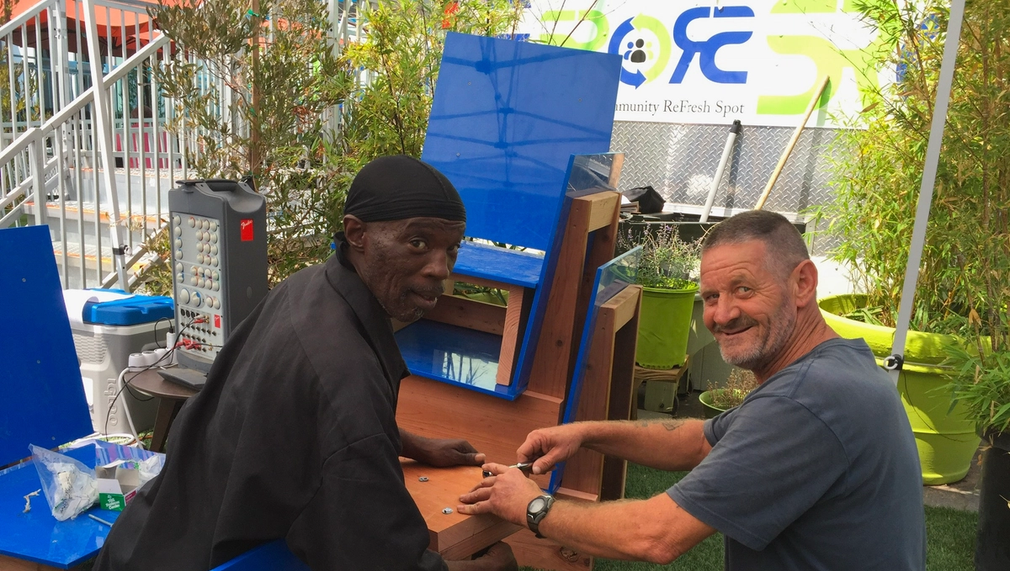Vibrant spaces built for and by the unhoused
The Community Builders Program (CBP) provides job training and employment in woodworking, furniture fabrication and community based design for housing insecure residents of LA. In this program, participants design and build accessible furniture for outdoor gathering spaces at supportive housing sites, homeless service centers, and other public spaces around LA. CBP creates sustainable, safe, vibrant spaces for the unhoused/recently housed community, while creating pathways to creative careers for people ready to (re)enter the workforce.

What is the primary issue area that your application will impact?
Access to Creative Industry Employment (sponsored by Snap Foundation)
In which areas of Los Angeles will you be directly working?
Central LA
East LA
South LA
In what stage of innovation is this project, program, or initiative?
Pilot or new project, program, or initiative
What is your understanding of the issue that you are seeking to address?
46% of unsheltered adults in LA county cite unemployment as a primary cause of their homelessness. Of those, approximately half reported that they are actively looking for work (LAHSA, 2019). Unhoused folks face multiple barriers to employment like being justice impacted, having mental or physical health challenges, and/or institutional factors such as hiring discrimination. For 10 years WW has provided work opportunities for these people who WOULD WORK if they could. Our workshops cultivate soft job skills, alleviate financial hardship, and provide recent job references. However, for some Artisans, like Christina, this short-term program wasn’t enough. Christina was eager to develop her skills and craftsmanship beyond what we covered. She wanted to pursue a career in woodworking, but did not yet have the hard skills to do so. And, as a poor Latinx woman living out of her car, she faced additional challenges and roadblocks to entering a predominantly white, housed, and cis male field.
Describe the project, program, or initiative this grant will support to address the issue.
The Community Builders Program (CBP) is a 6 month paid apprenticeship for Artisans who have completed our beginner program. CBP provides Artisans with advanced training in furniture making and community-led design while employing them to build outdoor furniture for housing sites, service centers, and public spaces throughout LA. CBP addresses the professional and creative ambitions of our Artisans by providing a roadmap to creative employment. It starts with our referral partner, a homeless service provider who refers an interested client to our beginner program, where she learns to hand sand and finish small homewares while gaining soft job skills. Then she applies to CBP, an in-depth course where she learns advanced woodworking, and is paid to build furniture for her community. In CBP she also tours professional woodshops, lumber yards and design studios, building a professional network so that upon completion she is well positioned to join the LA craft industry. But CBP doesn’t end with the Artisans. Because they are building furniture for communal spaces at housing sites and service centers around LA, their creative work is appreciated daily by the community at large. Not only does this flip the script about who designs public spaces or who does creative work in this city, it also allows people like Christina, who do not know if there is room for someone like her in the creative industries, to see that there is indeed, and that Would Works could help them get there.
Describe how Los Angeles County will be different if your work is successful.
In one year CBP will create pathways for stable employment in crafts for 12 housing insecure LA residents, including people historically underrepresented in the field of woodworking such as women, LGBTQ+ and BIPOC. We will furnish outdoor communal spaces in 5 supportive housing sites and/or homeless service centers thus providing sustainable, accessible, and vibrant outdoor communal settings for approximately 250-500 unhoused or recently housed LA residents. Coming out of 2+ years of COVID, these projects will also help combat heightened social isolation in LA. The pandemic has been particularly isolating for people experiencing homelessness, not only because of disproportionate health risks, but also because many services and public spaces shut down or reduced services. That’s why, more than ever, building safe and accessible outdoor gathering spaces for everyone in LA is vital to building back community engagement without compromising public health.
What evidence do you have that this project, program, or initiative is or will be successful, and how will you define and measure success?
CBP is at pilot phase with a small initial cohort of 3 Artisans who complete the program next month. For the last 6 months, these Artisans designed and built 8 entry-way benches out for the Willowbrook permanent supportive housing site in South LA. As we grow, we will measure impact and success by the number of spaces we build-out and the number of residents who have access to these spaces. We will also measure the number of Artisans we train in CBP and of those, the number of graduates who go on to find full time employment in the creative industries. Finally, we will collect personal narratives, available in the “Artisan Profiles” section of our website, to document the less quantifiable impacts of CBP on people’s lives. We acknowledge that there are many barriers to employment retention for people experiencing housing insecurity, and that it is sometimes the person who doesn’t go on to get the job, or isn't able to finish the program, who has been most positively impacted.
Approximately how many people will be impacted by this project, program, or initiative?
Direct Impact: 12
Indirect Impact: 1,000